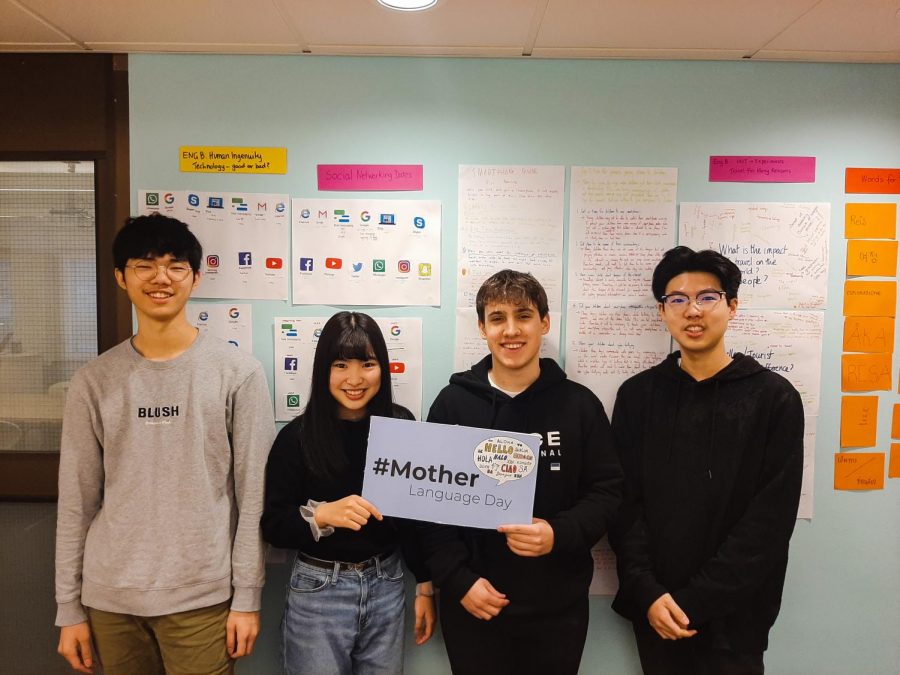What’s Your Language Part 3
Friday 21st is international Mother Language Day. At SIS we are celebrating all week with activities in class. Each day QQ will publish some of our students’ thoughts about their language. This is our 3rd and final part in the series – “What’s your language?”
Chiharu – Japanese
My name is Chiharu. I come from Japan and my mother tongue is Japanese. I can speak English. I have lived in the South of Japan, so I have a southern accent in Japanese.
A difference between Japanese and English
The alphabet is totally different. In Japanese, there are 3 sets of characters (Hiragana, Katakana, and Kanji) and we combine them to make words. There are 46 hiragana and katakana characters and both are used to represent the same sounds. Hiragana is the most mainly used, on its own or conjunction in the Japanese language with kanji and katakana is used for writing loanwords, foreign names and foreign countries. Kanji varies from two other types of characters – it represents meaning. You can represent all words in Hiragana, but when you use Kanji it is easier to understand. The exact number of Kanji is unknown, but in the largest Japanese dictionaries, there are about 50,000 Kanji listed.
日本語には三種類の字体があり、日本人はそれを組み合わせて文を構成します。46個のひらがなとカタカナがあり、それらはどちらも発音を表しています。しかし、ひらがなは単独または漢字と組み合わせて文章を形成するために使われ、カタカナは外来語、外交の名前など日本語にはなく海外から来た言葉を表すために使われます。漢字は他の二つとは異なり、意味を表現します。正確な漢字の数はわかりませんが、大漢和辞典には約5万語が記載されています。
A similarity between Japanese and English
The similarity between Japanese and English is that some words are the same as English. Especially scientific words and loanwords. However, the pronunciation has been changed to make it easier for Japanese to pronounce because there are many pronunciations in English that don’t exist in Japanese. For example, you pronounce coffee as “Kohi” and you pronounce Cupcake as “Kappukeki”.
日本語と英語の類似点は、最近の言葉や外来語は英語のまま使われているところです。しかし、英語には日本語には存在しない発音がたくさん存在するため、発音は日本人が発音しやすいように変化しています。例えば、Coffeeは「コーヒー」、Cupcakeは「カップケーキ」というように発音します。
_______________________________________________________________________________________
Xiaoyu – Chinese
My name is Xiaoyu L. I come from China and my mother tongue is Chinese. I can speak English. I have learned Swedish before, but I can not speak it. The city I live in is Shanghai, the traditional language of the Shanghai region is Shanghainese. So I can also speak Shanghainese.
A difference between Chinese and English
Chinese is completely different from English. Chinese does not have an alphabet. In English, the passive voice is very commonly used. Unlike English, Chinese usually uses the active voice. For example, 1)Tea is drunk widely all over the world. Chinese: 世界各地的人们都在喝茶.Translate directly to English: People all over the world are drinking tea.
A similarity between Chinese and English
Pinyin is the Romanization of Chinese characters based on their pronunciation. Although notably different in certain counterparts, Chinese Pinyin and English are similar in most of the pronunciation.
我的名字是李晓宇。我来自中国,我的母语是中文。我会说英语。我之前学过瑞典语,但是我不会说。我住在上海,在上海有一种当地的语言是上海话。同样我也会说上海话。
中文与英语的区别
中文与英语是十分的不同的。中文是没有字母表的。在英语中被动语态是非常常用的。不像英语,中文经常用主动语态。举个例子来说,1)茶在全世界被广泛的饮用。中文: 世界各地的人们都在喝茶。翻译过来就是: 全世界的人们都在喝茶。
中文与英语的相同点
拼音是根据汉字的发音来罗马化的。尽管对应的语言中有着巨大的区别,但是中文拼音和英语却有着相似处。
______________________________________________________________________________________
Junheok – Korean
My name is John (or Junheok). I come from South Korea and my mother tongue is Korean.
I also speak English. I know a little bit of Chinese and Japanese as I learned it in school. I am more used to the Japanese than the Chinese because I have watched anime too much. I can just say a few basic sentences and words.
A difference between Korean and English
First of all, the alphabets are totally different. For example, English uses a b c d e f g h i j k l m n o p q r s t u v w x y z, but in Korean, there are ㄱ ㄴ ㄷ ㄹ ㅁ ㅂ ㅅ ㅇ ㅈ ㅊ ㅋ ㅌ ㅍ ㅎ + ㅏ ㅑ ㅓㅕ ㅗㅛ ㅜㅠㅡ ㅣ ㅢ ㅝ ㅘ ㅟ ㅙ ㅒ ㅖ ㅞ .
A similarity between Korean and English
Koreans sometimes use words that come from English. We just pronounce them a little bit differently.
For example, Computer in Korean is ‘컴퓨터’ which is pronounced as keompyuteo. Also, Coffee in Korean is ‘커피’ which is pronounced as keopi
제 이름은 준혁입니다. 저는 대한민국에서 왔고 모국어는 한국어 입니다. 영어도 사용할수 있습니다. 그리고 저는 약간의 중국어와 일본어를 사용할수 있습니다 (다만 중국어는 거의 알아듣지 못하는 수준). 저는 중국어보다 일본어에 더욱 익숙한데 그 이유는 제가 애니를 너무 많이 봤기 때문입니다. 저는 약간의 문장과 단어를 구사할수 있습니다.
영어와 한국어의 차이점
첫번째로, 사용하는 철자가 다릅니다. 영어는 a b c d e f g h i j k l m n o p q r s t u v w x y z등을 사용하지만, 한국어에서는, ㄱ ㄴ ㄷ ㄹ ㅁ ㅂ ㅅ ㅇ ㅈ ㅊ ㅋ ㅌ ㅍ ㅎ + ㅏ ㅑ ㅓ ㅕ ㅗ ㅛ ㅜ ㅠ ㅡ ㅣ ㅢ ㅝ ㅘ ㅙ ㅞ ㅒ ㅖ 등을 사용합니다.
영어와 한국어의 비슷한점
한국어에는 외래어가 있습니다. 다만 발음이 약간 다른것 뿐이죠.
예를 들면, 영어의 Computer는 한국에서 keompyuteo로 발음 합니다. 또한, 영어의 Coffee는 한국에서 keopi 로 발음 됩니다.
_____________________________________________________________________________________
Akos – Hungarian
English
My name is Akos. I come from Hungary and my mother tongue is Hungarian. I speak English as well since I have learnt in an international school for the past six years. I have never lived anywhere else other than Hungary and Sweden. I speak Hungarian almost perfectly before as I lived there for eleven years, but ever since I moved to Sweden, I’ve mainly been speaking English and my Hungarian has got a bit worse.
The differences between Hungarian and English
There are many plural forms in Hungarian. You have to look at the word and the last letter, and based on that, you are supposed to put in the correct plural form. If a word ends with a consonant; for example, if we’re talking about a book, then you would say that as “books” in plural form. Since this word ends with a consonant, you add two letters after the actual word. If it is a word that ends with a vowel, you only put one letter.
If you say the name of something important in Hungarian, you don’t always put capital letters, only if you start the sentences with that word. In English, you say English as “English”, but in Hungarian, you say Hungarian as “magyar”.
.Hungarian
Az én nevem Ákos, Magyarországról származok és az anyanyelvem magyar. Angolul is beszélek, mivel az elmúlt hat évben ezt tanultam egy nemzetközi iskolában. Még sehol nem éltem Magyarországon és Svédországon kívül, ez a két ország ahol eddig éltem. Nagyon jól tudtam magyarul beszélni régebben, mivel tizenegy évig ott éltem, de mióta Svédországban élek, sokkal többet beszélek angolul és a magyarom valamennyivel rosszabb.
A külonbség a magyar és az angol között
Magyarul nagyon sok többes számú kifejezés van. Mindig a szót kell nézni, hogy milyen betűvel végződik és az alapján be tudod helyezni a helyes többesszám alakot. Ha egy szó egy mássalhangzóval fejeződik be; például ha egy könyvről van szó, akkor azt többes számban úgy mondanád, hogy “könyvek”. Mivel ez a szó egy mássalhangzóval fejeződik be, kettő betűt kellett behelyezni.
Egy szó, ami magánhangzóval végződik, oda csak egy betűt teszel.
Ha magyarul írsz főneveket , akkor kevesebbet írsz nagybetűvel, csak akkor, hogyha azzal a szóval kezded a mondatodat, vagy tulajdonnév ről van szó. Angolban az angolt úgy írod, hogy “English”, de magyarul a magyart mondat közben csak úgy írod, hogy “magyar”.
Így működnek a magyarban a többes számú szavak, és angolban ilyenkor csak egy “s”-et teszel a szavak után.
Consonant:
Könyv – könyvek (book – books)
Vowel
Autó – autók (car – cars)



